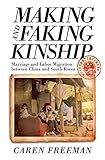Making and faking kinship : marriage and labor migration between China and South Korea / Caren Freeman.
Material type: TextPublication details: Ithaca : Cornell University Press, (c)2011.Description: 1 online resource (xiv, 263 pages) : illustrations, mapContent type:
TextPublication details: Ithaca : Cornell University Press, (c)2011.Description: 1 online resource (xiv, 263 pages) : illustrations, mapContent type: - text
- computer
- online resource
- 9780801462818
- HQ1032 .M355 2011
- COPYRIGHT NOT covered - Click this link to request copyright permission: https://lib.ciu.edu/copyright-request-form
| Item type | Current library | Collection | Call number | URL | Status | Date due | Barcode | |
|---|---|---|---|---|---|---|---|---|
 Online Book (LOGIN USING YOUR MY CIU LOGIN AND PASSWORD)
Online Book (LOGIN USING YOUR MY CIU LOGIN AND PASSWORD)
|
G. Allen Fleece Library ONLINE | Non-fiction | HQ1032 (Browse shelf(Opens below)) | Link to resource | Available | ocn763161307 |
Browsing G. Allen Fleece Library shelves, Shelving location: ONLINE, Collection: Non-fiction Close shelf browser (Hides shelf browser)
In the years leading up to and directly following rapprochement with China in 1992, the South Korean government looked to ethnic Korean (Chosǒnjok) brides and laborers from northeastern China to restore productivity to its industries and countryside. South Korean officials and the media celebrated these overtures not only as a pragmatic solution to population problems but also as a patriotic project of reuniting ethnic Koreans after nearly fifty years of Cold War separation. As Caren Freeman's fieldwork in China and South Korea shows, the attempt to bridge the geopolitical divide in the name of Korean kinship proved more difficult than any of the parties involved could have imagined. Discriminatory treatment, artificially suppressed wages, clashing gender logics, and the criminalization of so-called runaway brides and undocumented workers tarnished the myth of ethnic homogeneity and exposed the contradictions at the heart of South Korea's transnational kin-making project. Unlike migrant brides who could acquire citizenship, migrant workers were denied the rights of long-term settlement, and stringent "as restricted their entry. As a result, many Chosǒnjok migrants arranged paper marriages and fabricated familial ties to South Korean citizens to bypass the state apparatus of border control. Making and Faking Kinship depicts acts of "counterfeit kinship," false documents, and the leaving behind of spouses and children as strategies implemented by disenfranchised people to gain mobility within the region's changing political economy.
Includes bibliographies and index.
Chosŏnjok maidens and farmer bachelors -- Brides and brokers under suspicion -- Gender logics in conflict -- Faking kinship -- Flexible families, fragile marriages -- A failed national experiment?
COPYRIGHT NOT covered - Click this link to request copyright permission:
There are no comments on this title.







